एसईओ और डिजिटल मार्केटिंग के लिए वेब स्क्रैपिंग: डेटा अंतर्दृष्टि को अधिकतम करना और परिणाम प्राप्त करना
डेटा ही राजा है! किसी ने शायद पहले भी कहीं यह कहा होगा, और अब पहले से कहीं ज़्यादा, यह कथन पूरी तरह सच साबित हो रहा है। डेटा उत्पन्न करने के लिए, कई व्यवसाय विभिन्न प्रकार की डेटा निष्कर्षण तकनीकों का उपयोग कर रहे हैं, जिनमें वेब स्क्रैपिंग सबसे लोकप्रिय विकल्पों में से एक है।
वेब स्क्रैपिंग वेबसाइटों से डेटा निकालने के लिए कई तकनीकों का एक संयोजन है। और सही SEO वेब स्क्रैपिंग रणनीति के साथ, आप अपने प्रतिस्पर्धियों को पानी से बाहर उड़ा सकते हैं।
तो, इस लेख में, हम उचित रूप से समझाएंगे कि यह कैसे संभव है और आपके डिजिटल मार्केटिंग में SEO के लिए वेब स्क्रैपिंग को लागू करने से आपको कितने फायदे होंगे।
बिना किसी और हलचल के, चलिए शुरू करते हैं।
डिजिटल मार्केटिंग बनाम SEO

आइए डिजिटल मार्केटिंग क्या है, इसकी संक्षिप्त समीक्षा के साथ शुरुआत करें और यह भी समझें कि SEO क्या है।
डिजिटल मार्केटिंग या ऑनलाइन मार्केटिंग एक आधुनिक मार्केटिंग रणनीति है जिसमें ढेर सारी इलेक्ट्रॉनिक, डिजिटल और इंटरनेट-आधारित तकनीकें शामिल होती हैं। यह ईमेल मार्केटिंग को सोशल मीडिया मार्केटिंग, वेब विज्ञापनों, कंटेंट मार्केटिंग, इन्फ्लुएंसर मार्केटिंग और डिजिटल विज्ञापनों के अन्य रूपों के साथ जोड़ती है।
अगर आपको समझ नहीं आ रहा है, तो अपने स्मार्टफ़ोन पर आने वाले YouTube और Facebook विज्ञापनों या "परेशान करने वाले" विज्ञापनों के बारे में सोचें। न्यूज़लेटर ईमेल जो आपको कोई उत्पाद खरीदने के लिए प्रेरित कर रहा है।
दूसरी ओर, SEO या सर्च इंजन ऑप्टिमाइज़ेशन, डिजिटल मार्केटिंग का एक उपसमूह है जो विशेष रूप से सर्च इंजन परिणामों और किसी वेबसाइट को सर्च इंजन परिणामों में उच्च रैंक कैसे दिलाए, इस पर केंद्रित है। SEO में किसी वेबसाइट पर आने वाले ट्रैफ़िक की दृश्यता और गुणवत्ता में सुधार करना शामिल है।
अच्छा SEO क्यों ज़रूरी है? खैर, एक अध्ययन के अनुसार, 25% से ज़्यादा लोग किसी भी सर्च रिजल्ट के सबसे पहले लिंक पर क्लिक करते हैं, और केवल 2.5% ही दसवें लिंक तक पहुँच पाते हैं; और वह भी सिर्फ़ पहले पेज पर। ज़्यादातर लोग दूसरे रिजल्ट पेज पर जाने की ज़हमत भी नहीं उठाते। आखिरकार, हमारे पास हज़ारों वेबसाइटें हैं, जो पहले पेज पर आने और उस पेज पर सबसे ऊँची रैंक पाने के लिए होड़ करती हैं। यह परिणाम केवल अच्छे SEO से ही प्राप्त किया जा सकता है।
SEO के लिए वेब स्क्रैपिंग
इंटरनेट पर अरबों वेब पेज हैं। अब, कल्पना कीजिए कि आप अपने लिए प्रासंगिक जानकारी इकट्ठा करने के लिए उन वेब पेजों को मैन्युअल रूप से खोज और स्क्रॉल कर रहे हैं! अगर यह थकाऊ लग रहा है, तो ऐसा इसलिए है क्योंकि यह है। अच्छी खबर यह है कि वेब स्क्रैपिंग स्वचालित रूप से कॉलेटिंग प्रक्रिया का ध्यान रखता है।
सरल स्तर पर, वेब स्क्रैपिंग, वेब स्क्रैपिंग टूल का उपयोग करके वेब पेजों से संरचित प्रारूप में डेटा प्राप्त करने के लिए विभिन्न स्वचालित तकनीकों का एक संयोजन है।
वेब स्क्रैपिंग टूल या वेब स्क्रैपर उन चुनिंदा वेबसाइटों को क्रॉल कर सकते हैं जिनसे आपको जानकारी चाहिए, और बिना किसी परेशानी के आपको आवश्यक सटीक जानकारी प्राप्त कर सकते हैं। फिर एकत्रित डेटा को आवश्यकतानुसार स्प्रेडशीट या डेटाबेस में संकलित किया जा सकता है। आप वेब स्क्रैपिंग के बारे में अधिक जानकारी हमारे वेब स्क्रैपिंग के लिए शुरुआती गाइड में पढ़ सकते हैं।
लेकिन SEO के लिए वेब स्क्रैपिंग क्या है?
अधिक विशिष्ट होने के लिए, एसईओ या एसईओ वेब स्क्रैपिंग के लिए वेब स्क्रैपिंग में प्रतिस्पर्धियों की वेबसाइटों या सोशल मीडिया पेजों से डेटा एकत्र करना, एकत्रित डेटा का विश्लेषण करना और एसईओ रुझान उत्पन्न करना शामिल है जिसका उपयोग आप किसी संगठन की डिजिटल मार्केटिंग रणनीतियों को बेहतर बनाने के लिए कर सकते हैं।
एसईओ वेब स्क्रैपिंग के साथ, आप या आपकी टीम प्रतिस्पर्धी वेबसाइटों पर त्वरित, गहन शोध कर सकती है, खासकर उन मामलों में जहां टन वेब पेजों का विश्लेषण करने की आवश्यकता होती है। एसईओ वेब स्क्रैपिंग पेज रैंकिंग, कीवर्ड उपयोग, प्रासंगिक खोज शब्दावली और डोमेन प्राधिकरण पर महत्वपूर्ण जानकारी एकत्र करने में मदद करता है।
आप इसका उपयोग मृत या टूटे हुए लिंक, अअनुकूलित पृष्ठों और विशाल बाउंस दरों वाले वेब पेजों जैसे समस्याग्रस्त मुद्दों की शीघ्रता से पहचान करने के लिए भी कर सकते हैं।
SEO स्क्रैपिंग के कानूनी निहितार्थ
त्वरित प्रश्न, क्या SEO स्क्रैपिंग करना कानूनी है? हाँ, यह कानूनी है।
सामान्य तौर पर, SEO स्क्रैपिंग तब तक कानूनी है जब तक यह वेबसाइट के नियमों और शर्तों की सीमाओं के भीतर किया जाता है। ज़िम्मेदार एसईओ वेब स्क्रैपिंग वेबसाइट के संसाधनों और विज़िटर अनुभव का सम्मान करती है। दूसरी ओर, शोषणकारी एसईओ स्क्रैपिंग वेब की कमज़ोरियों का फ़ायदा उठाकर वेबसाइटों को नुकसान पहुँचाने की कोशिश करती है।
इसलिए सावधानी बरतें और SEO के लिए वेब स्क्रैपिंग करते समय संवेदनशील जानकारी और कॉपीराइट उल्लंघन से बचें।
वेब स्क्रैपिंग के साथ SEO अंतर्दृष्टि कैसे एकत्र करें

आइए एक त्वरित जानकारी प्राप्त करें कि आप SEO वेब स्क्रैपिंग के साथ SEO अंतर्दृष्टि कैसे एकत्र कर सकते हैं:
1.
वेब स्क्रैपिंग से पहले, आपको अपनी SEO स्क्रैपिंग के लिए विशिष्ट योजनाएँ, लक्ष्य और उद्देश्य बनाने होंगे। आपको कुछ प्रासंगिक प्रश्न पूछने होंगे।
आप अपनी वेब स्क्रैपिंग से कौन-सी SEO जानकारी प्राप्त करना चाहते हैं?
- आप किन वेबसाइटों या प्रतिस्पर्धियों को लक्षित करने जा रहे हैं?
- एकत्रित जानकारी किस प्रारूप में रिकॉर्ड की जाएगी?
- आप कौन सा वेब स्क्रैपिंग टूल इस्तेमाल करने वाले हैं?
- क्या आप स्क्रैपर को ऑनसाइट या क्लाउड पर चलाएँगे? स्क्रैप किए गए डेटा को कैसे निर्यात और विश्लेषण किया जाएगा?
- क्या वेबसाइट में आसान स्क्रैपिंग के लिए API है?
क्या वेबसाइट में एंटी-स्क्रैपिंग सुरक्षा है? वेब स्क्रैपिंग शुरू करने से पहले इन सभी और अधिक को निर्धारित किया जाना चाहिए।
वेब स्क्रैपिंग के संबंध में वेबसाइट के नियमों को समझने के लिए आपको robots.txt फ़ाइल को भी पढ़ना होगा।
2. वेब को स्क्रैप करें
अगला काम यह है कि आप अपना वेब स्क्रैपिंग टूल चलाएं, वेब को स्क्रैप करें, और आवश्यक जानकारी और डेटा एकत्र करें। आप Beautiful Soup जैसे वेब स्क्रैपिंग टूल का उपयोग कर सकते हैं।
3. संकलित डेटा निर्यात करें
स्क्रैपिंग पूरी हो जाने के बाद, अगला चरण स्क्रैपिंग टूल से डेटा निर्यात करना है। आसान SEO विश्लेषण के लिए एक उपयुक्त फ़ॉर्मेट चुनने का प्रयास करें। यह CSV, एक्सेल शीट, JSON या डेटाबेस भी हो सकता है।
4. डेटा का विश्लेषण करें
वेब स्क्रैपिंग टूल से डेटा का विश्लेषण करें और आवश्यक जानकारी और कीवर्ड एकत्र करें। डेटा का विश्लेषण करने से पहले आपको कुछ डेटा क्लीनिंग करने की आवश्यकता हो सकती है।
वैसे, डेटा क्लीनिंग में आउटलायर्स, गलत जानकारी और डुप्लिकेट डेटा को हटाना शामिल है। इसमें कभी-कभी आपके द्वारा प्राप्त डेटा को पुन: स्वरूपित करना भी शामिल होता है, ताकि उसका विश्लेषण करना आसान हो जाए
5. अपने विश्लेषण के परिणामों को लागू करें या उन्हें संबंधित हितधारकों के साथ साझा करें
अब जब आपके पास अपने प्रतिस्पर्धियों से जानकारी है, तो उसे लागू करें! SEO वेब स्क्रैपिंग से प्राप्त विश्लेषणित जानकारी पर कार्य करें। अपने डिजिटल मार्केटिंग अभियानों को परिष्कृत करने के लिए इसका उपयोग करें।
कुछ प्रासंगिक कीवर्ड चुनें, और उन्हें अपनी वेब सामग्री और ब्लॉग पोस्ट को बेहतर बनाने के लिए लागू करें। आप अपने प्रतिस्पर्धियों की कुछ रणनीतियों को भी देख सकते हैं और उन्हें अपनी मार्केटिंग रणनीतियों के अनुरूप ढाल सकते हैं। ध्यान दें कि यह सब तभी ठीक है जब आप कानूनी सीमाओं का उल्लंघन न करें, या सीधे तौर पर कॉपीराइट का उल्लंघन न करें।
6. परिणामों का मूल्यांकन करें
चरण 5 पूरा करने के बाद, अपने डिजिटल मार्केटिंग अभियान के परिणामों का मूल्यांकन करें और आवश्यकतानुसार अपने अभियानों में बदलाव करें। याद रखें कि आप केवल ट्रैक कर सकते हैं यदि आपके पास मापने योग्य मेट्रिक्स हैं तो विकास।
वेब स्क्रैपिंग के साथ अपने डिजिटल मार्केटिंग को कैसे बेहतर बनाएं

SEO जानकारी इकट्ठा करने और अपनी डिजिटल मार्केटिंग रणनीतियों में बदलाव करने के अलावा, SEO वेब स्क्रैपिंग आपके डिजिटल मार्केटिंग को और कैसे बेहतर बनाता है? यहाँ कुछ हैं:
1. बाज़ार के रुझान पहचानें
SEO वेब स्क्रैपिंग का एक मुख्य उपयोग वेब पेजों में प्रासंगिक कीवर्ड की पहचान करना है जो बाज़ार के रुझान दिखाते हैं।
इसे और सरल बनाने के लिए, यहाँ एक त्वरित उदाहरण दिया गया है। एक फ़ैशन संगठन वेब स्क्रैपिंग के विश्लेषण का उपयोग करके सबसे ज़्यादा चलन में रहने वाले कपड़ों और बेचने के लिए ब्रांड की पहचान कर सकता है।
"कीवर्ड मिलान" भी होता है। कीवर्ड मिलान उन पूरक वस्तुओं और उत्पादों की पहचान करने में मदद करता है जिनकी समीक्षाएं या अपमानजनक शब्द मेल खाते हैं। इससे उन उत्पादों की पहचान करने में मदद मिलती है जो बाज़ार के लिए उपयुक्त नहीं हैं।
2. नई SEO-अनुकूलित वेब सामग्री बनाएँ और मौजूदा वेब सामग्री को ताज़ा करें
वेब स्क्रैपिंग विश्लेषण से प्राप्त कीवर्ड्स की मदद से, आप अपने वेब पेजों को उच्च रैंक देने के लिए नए ब्लॉग पोस्ट और वेब सामग्री बना सकते हैं। आप अपनी वेब सामग्री में नए प्रासंगिक कीवर्ड जोड़कर उसे ताज़ा भी कर सकते हैं।
आप प्रतिस्पर्धियों पर भी नज़र रख सकते हैं। अपने को अनुकूलित करने के लिए बैकलिंक्स और मेटाडेटा।
3. सोशल मीडिया पोस्ट में प्रासंगिक कीवर्ड, कैप्शन और हैशटैग संलग्न करें
कंपनियां अक्सर अपने सोशल मीडिया पोस्ट पर समान हैशटैग और कीवर्ड का पुन: उपयोग करने की गलती करती हैं। इससे उबाऊ और दोहराव वाले सोशल मीडिया पोस्ट हो सकते हैं, जिनके ग्राहक आदी हो गए हैं।
लेकिन एसईओ वेब स्क्रैपिंग के साथ, आप वायरल और प्रभावी डिजिटल मार्केटिंग के लिए नए कैप्शन, कीवर्ड और हैशटैग के लिए ट्रेंडी, प्रासंगिक शब्दों को इंगित कर सकते हैं।
4. प्रतिस्पर्धी की पेशकशों और कीमतों पर नज़र रखें
वेब स्क्रैपिंग आपको अपने प्रतिस्पर्धियों की पेशकशों और कीमतों पर तेज़ी से और व्यवस्थित तरीके से नज़र रखने में मदद कर सकती है। कल्पना कीजिए कि आप अपने प्रतिस्पर्धी की वेबसाइट पर हर उत्पाद और कीमत को मैन्युअल रूप से क्रॉल करके, उसे एक्सेल शीट पर टाइप करने से पहले, उसे सूचीबद्ध करते हैं; कितना थकाऊ है ना?
एक वेब क्रॉलर आपको बहुत कम समय में और कम मेहनत में वही परिणाम देगा।
5. जुड़ाव दर और उत्पाद जनसांख्यिकी का अध्ययन करें
SEO स्क्रैपिंग डिजिटल बाज़ारों को सोशल मीडिया पोस्ट्स की जुड़ाव दरों को ट्रैक करने और इन पोस्ट्स का जनसांख्यिकीय विश्लेषण करने में मदद कर सकती है। आप अपनी डिजिटल मार्केटिंग रणनीति को बेहतर बनाने के लिए प्रतिस्पर्धी ब्रांडों के सोशल मीडिया फ़ॉलोअर्स की जनसांख्यिकी का भी विश्लेषण कर सकते हैं।
6. मार्केटिंग ईमेल को स्क्रैप करके अपने ईमेल मार्केटिंग अभियान में सुधार करें
डिजिटल मार्केटर्स प्रासंगिक जानकारी के लिए ईमेल विषय पत्रों और अभियानों को स्क्रैप करके सफल ईमेल अभियान बना सकते हैं। आप एकत्रित डेटा के माध्यम से ओपन और क्लिक-थ्रू दरों की एक झलक भी प्राप्त कर सकते हैं।
ये छह कई तरीकों में से कुछ हैं जो एसईओ वेब स्क्रैपिंग आपके और आपके डिजिटल मार्केटिंग व्यवसाय के लिए फायदेमंद हो सकते हैं।
निष्कर्ष
संक्षेप में, एसईओ उद्देश्यों के लिए वेब स्क्रैपिंग आपके डिजिटल मार्केटिंग की प्रभावशीलता बढ़ाने का एक अचूक तरीका। यह आपके ग्राहकों की आदतों और प्रतिस्पर्धियों की रणनीतियों के बारे में प्रासंगिक जानकारी इकट्ठा करने में आपकी मदद कर सकता है, और यह आपको एक अनूठा व्यावसायिक परिप्रेक्ष्य भी प्रदान कर सकता है जिसके बारे में आपको तब तक पता नहीं चलता जब तक आपने वेब को स्क्रैप नहीं किया होता।
इसके बावजूद, आपको सर्वोत्तम SEO स्क्रैपिंग परिणाम प्राप्त करने के लिए सही टूल्स के संयोजन का उपयोग करने की आवश्यकता होगी। एक बेहतरीन एंटी-डिटेक्टर ब्राउज़र और वेब स्क्रैपर जैसे टूल्स।
पहली नज़र में, यह समझना आसान है कि आपको एक बेहतरीन वेब स्क्रैपर की आवश्यकता क्यों है। लेकिन आपको एक बेहतरीन वेब स्क्रैपर की आवश्यकता क्यों है? एंटीडिटेक्ट ब्राउज़र?
कुछ वेबसाइटें कुछ खास जगहों, आईपी एड्रेस और खास अकाउंट या डिवाइस टाइप को अपनी वेबसाइट एक्सेस करने से रोकती हैं। कुछ वेबसाइट्स आपको कुछ खास सेक्शन को स्क्रैप करने से पहले अकाउंट बनाने की ज़रूरत पड़ सकती है, और इन अलग-अलग अकाउंट पर कुछ पाबंदियाँ भी लग सकती हैं।
एंटीडिटेक्ट ब्राउज़र आपको इन अनोखे हालातों में नेविगेट करने में मदद करेंगे। और उद्योग में अग्रणी AdsPower से बेहतर एंटीडिटेक्ट ब्राउज़र की सिफारिश और क्या की जा सकती है!
अपनी शीर्ष-स्तरीय स्पूफिंग क्षमताओं और बहु-खाता प्रबंधन के साथ, AdsPower दुनिया भर के ऑनलाइन विपणक और व्यवसायों के लिए सर्वश्रेष्ठ एंटी-डिटेक्ट ब्राउज़रों में से एक बना हुआ है।
कुल मिलाकर, यह लेख केवल इस बारे में बात करता है कि वेब स्क्रैपिंग SEO और डिजिटल मार्केटिंग के लिए कैसे फायदेमंद हो सकता है। यह देखने के लिए कि यह अन्य व्यावसायिक क्षेत्रों को कैसे लाभ पहुंचा सकता है, हमारे ब्लॉग पर जाएँ पृष्ठ.

लोग यह भी पढ़ें
- 2026 के सर्वश्रेष्ठ डेटिंग साइट्स और ऐप्स: सही प्लेटफॉर्म कैसे चुनें
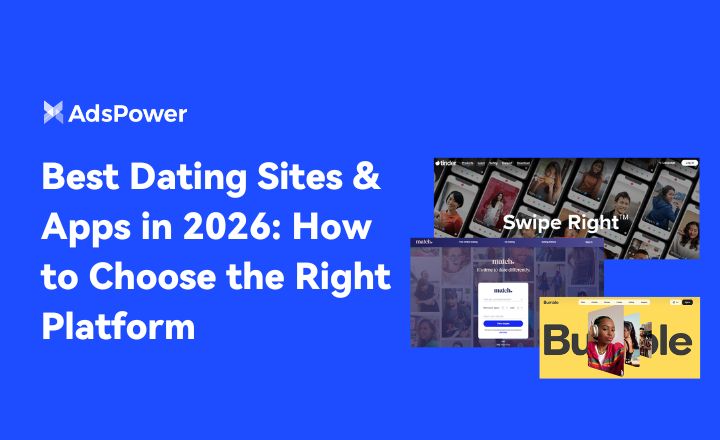
2026 के सर्वश्रेष्ठ डेटिंग साइट्स और ऐप्स: सही प्लेटफॉर्म कैसे चुनें
2026 के सर्वश्रेष्ठ डेटिंग साइट्स और ऐप्स को एक्सप्लोर करें। मुफ़्त और सशुल्क प्लेटफ़ॉर्म की तुलना करें, सुरक्षित रूप से चुनने का तरीका जानें और कई डेटिंग अकाउंट्स को मैनेज करना सीखें।
- फेसबुक विज्ञापन खाता किराये पर लेने की प्रक्रिया: बढ़ते विज्ञापनदाताओं के लिए एक व्यावहारिक मार्गदर्शिका
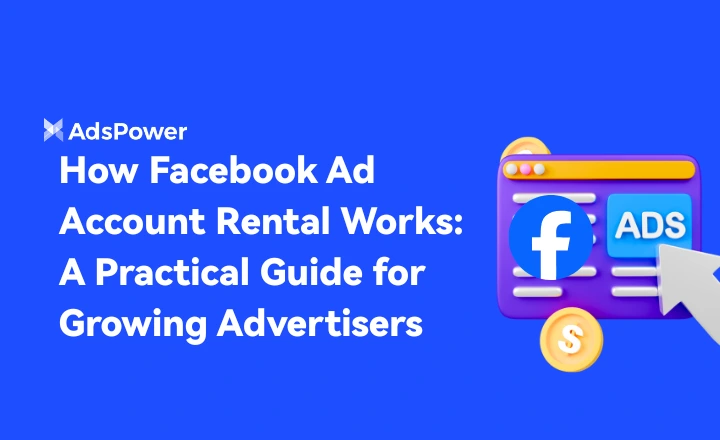
फेसबुक विज्ञापन खाता किराये पर लेने की प्रक्रिया: बढ़ते विज्ञापनदाताओं के लिए एक व्यावहारिक मार्गदर्शिका
यह गाइड फेसबुक विज्ञापन खाता किराये पर लेने और जीडीटी एजेंसी और एड्सपावर का उपयोग करके मेटा-व्हाइटलिस्टेड खातों के साथ सुरक्षित रूप से स्केल करने के तरीके के बारे में बताती है।
- क्रोम (मोबाइल और डेस्कटॉप) पर खाते कैसे बदलें
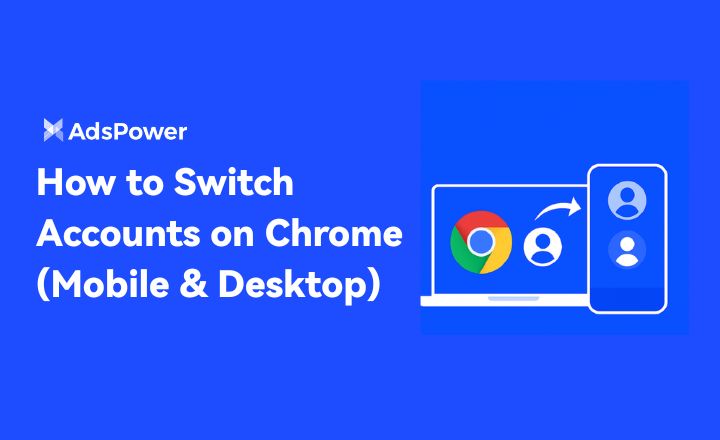
क्रोम (मोबाइल और डेस्कटॉप) पर खाते कैसे बदलें
डेस्कटॉप और मोबाइल के लिए Chrome पर अकाउंट बदलने का तरीका जानें। डेटा के मेल-मिलाप से बचें, कई Google अकाउंट सुरक्षित रूप से प्रबंधित करें, और अलग-अलग प्रोफ़ाइल का इस्तेमाल करें।
- ब्लैक फ्राइडे एंटी-बैन चेकलिस्ट: अपने विज्ञापनों, भुगतानों और ईकॉमर्स खातों की सुरक्षा करें
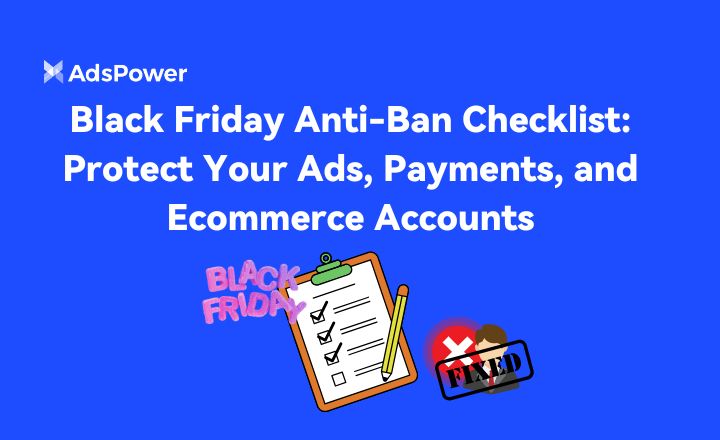
ब्लैक फ्राइडे एंटी-बैन चेकलिस्ट: अपने विज्ञापनों, भुगतानों और ईकॉमर्स खातों की सुरक्षा करें
इस ब्लैक फ्राइडे पर अपने विज्ञापनों, भुगतान गेटवे और ई-कॉमर्स खातों को एक सिद्ध प्रतिबंध-विरोधी चेकलिस्ट और AdsPower रणनीतियों के साथ सुरक्षित रखें ताकि झंडों से बचा जा सके
- 2025 के 9 सर्वश्रेष्ठ TikTok प्रॉक्सी
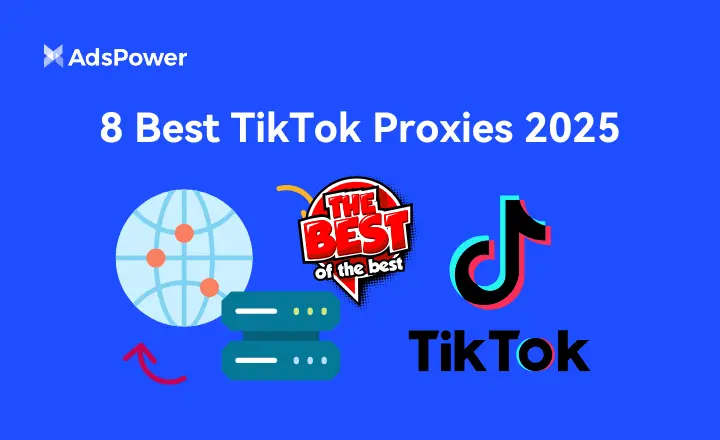
2025 के 9 सर्वश्रेष्ठ TikTok प्रॉक्सी
2025 के 9 सर्वश्रेष्ठ TikTok प्रॉक्सी के साथ वैश्विक विकास को अनलॉक करें। TikTok स्वचालन के लिए शीर्ष आवासीय और 4G/5G मोबाइल प्रॉक्सी की तुलना करें ताकि प्रतिबंधों को दरकिनार किया जा सके और


